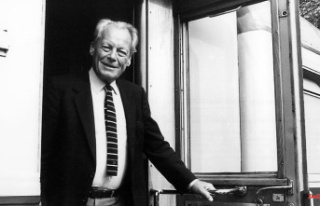The end of combustion engines at EU level is on the brink because the FDP does not want to sign the draft law without an addition for e-fuels. An inefficient and expensive idea, says traffic expert Ulf Neuling in an interview with ntv.de. There is already a realistic alternative in road traffic, says the project manager for fuels at the Agora Verkehrswende think tank. "So why should we use e-fuels here?"
ntv.de: Transport Minister Volker Wissing wants "that we also allow combustion engines beyond 2035 if they can only be operated with synthetic fuels". What speaks against it?
Ulf Neuling: Germany has set itself the goal of becoming climate-neutral by 2045. Electric vehicles are the most efficient option for this. If vehicles with internal combustion engines are registered after 2035, they should not be fueled with classic fossil petrol or diesel, but only with synthetic fuels. However, these are energy-intensive and expensive to produce. Other sectors need the hydrogen that is needed for this more urgently.
There are only twelve years until 2035. Can we produce so many e-cars in this time and expand the charging network so well that it is realistic to phase out combustion vehicles?
The expansion of electromobility and the necessary charging infrastructure is feasible if the federal government creates the right framework conditions for it. This is precisely why no further incentives for combustion engine technologies should be given at the same time. In addition, two points are being confused in the current debate: the current EU legislative proposal is not about a ban on combustion cars, but rather that no new combustion engines will be added from 2035 onwards. The combustion engines that are on the road by then can continue to be used. It's about a smooth transition.
Combustion engines could therefore still be bought in 2034. Should they continue to run on petrol? Possibly even beyond the target date of 2050 for a climate-neutral Europe?
New cars in Germany are driven for an average of 12 to 15 years. Of course, a solution must also be found for the existing vehicles. Renewable and environmentally friendly fuels with low CO₂ emissions such as e-fuels are one way to keep the existing fleet running.
If e-fuels are already being used, why not also for newly registered cars?
In the long run, synthetic fuels will only be available to us in small quantities. These can be used more sensibly in aviation and shipping, where there are few alternatives. Airplanes, especially for long-haul flights, will not be able to be powered by batteries in the future. On the other hand, there is a realistic alternative in road traffic. Electromobility works well, we have experience with it and the construction is already underway. In addition, e-fuels for cars are very inefficient. They require about four to five times as much electricity as an electric vehicle. So why should we use e-fuels here when we can make better use of them elsewhere?
Even the car industry only speaks of e-fuels in connection with the old stock. Why is the auto industry opposed to the use of e-fuels in new vehicles after 2035?
Quite simply: the combustion engine has no future as a business model. The faster car manufacturers switch to electromobility, the better their economic prospects. No company can afford to develop two completely different drives in parallel in the long term. You can already see that the German car manufacturers are chasing after the Chinese market. Much smaller, more efficient and cheaper electric vehicles are being built there. So the German automakers have to spend a lot more energy trying to catch up here.
What about the expansion of facilities for synthetic fuels?
So far, there are only a few plants that produce e-fuels. They produce a couple of 100 liters a day. That is less than 0.1 percent of consumption. In order to ramp up production, the plants first have to be built. After that we will need a lot of renewable electricity and hydrogen. E-fuels will therefore remain scarce and expensive in the long term.
Will the expansion not be pushed ahead in the next few years?
Of course we have to increase the amounts of e-fuels. But such a plant takes at least three to five years to be built and commissioned. We need enormous quantities just to meet the needs of shipping and aviation. And we're not even talking about registered passenger cars that will need e-fuels after 2035. This will be a major challenge over the next 20 years.
Isn't there a way to increase the efficiency of e-fuels?
No, e-fuels cannot really become more efficient. Processes for the production of synthetic fuels have been around for more than 100 years. They were originally invented to make synthetic fuels from coal during World War II. It is therefore a well-known, mature technology. There may be a few percent increase in efficiency, but that's not much. On the other hand, further increases in efficiency can be expected from the electric motor and the charging process. In comparison, the efficiency gains would at least balance each other out.
Clara Suchy spoke to Ulf Neuling












